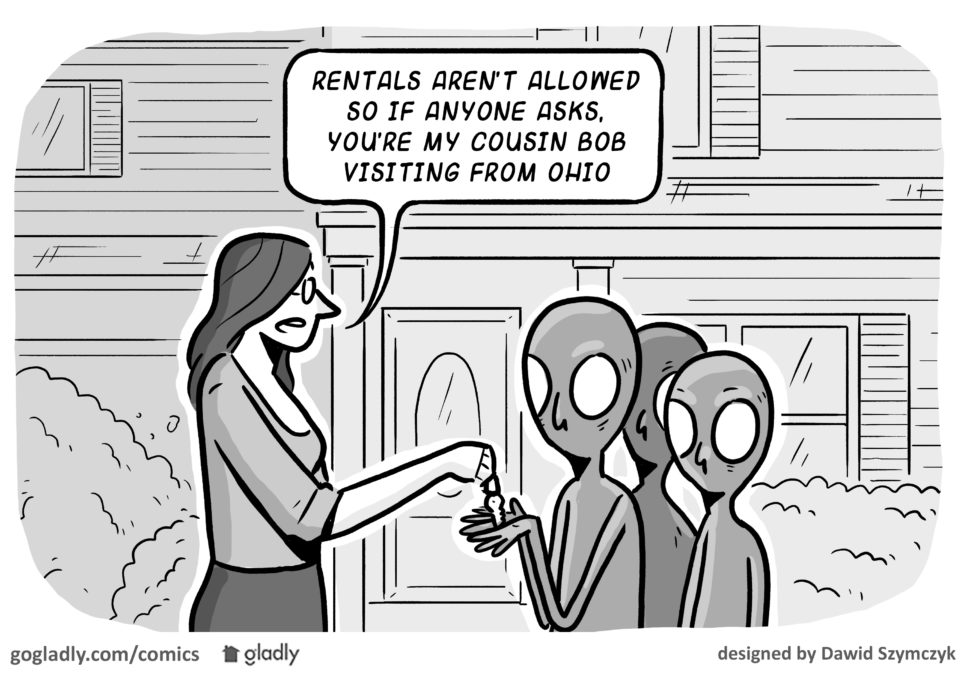Most governing documents regulate the minimum length of time a residence may be rented; this is usually no less than 30 days. Yet, with the advent of Airbnb and similar sites, owners have discovered a new income stream through short term rental of their homes, often at the expense of the entire community.
Disclaimer: Get Legal Council. If your community is considering permitting or prohibiting short-term rentals, you must consult with the association’s legal counsel before taking any action. The governing documents of each community vary. Association’s legal counsel must advise the Board how to proceed. Do not try to do this alone.
To Permit or Not to Permit Short Term Rentals
For some communities, HOA short-term rentals are OK. The owners want to use their dormant property for short term rental and income, the governing documents permit short-term rentals, and the community is in agreement.
For other communities, short-term rentals mean noisy parties, damage to common area, and a general unease of having strangers in your community.
Local Regulations
Permits and Taxes: Contact the local government agency in your area that regulates or collects taxes on short-term rentals. Municipalities absolutely want payment of the transient occupancy tax, but not all municipalities currently require homeowners to acquire any sort of “permit” to run a short-term rental. This may be changing as more homeowner complaints flood City offices.
Allowing HOA Short Term Rentals
If your governing documents permit short-term rentals, and your community wants short-term rentals, my suggestion is that that the Board, with the assistance of community input, establish a Short-Term Rental Policy, that includes the following, and whatever else serves the needs of your community. This document must go to legal counsel for review.
Rental Information
Owner provides the following information to management or Board representative:
- Lease details: start and end dates.
- Contact Information: Name and Phone of person renting unit.
- Fee: A reasonable fee may be established by the Board to cover additional costs incurred by rental properties (make it realistic)
Know Before You Rent:
- Short-Term Rental Agreement: The rental agreement shall include rules, as established by the Board/Community, i.e. noise hours, pool use, outdoor fires, alcohol in the common area, etc. Again, this is the type of information your attorney helps you determine is applicable, and legal, for your community.
- Fines: The Short-Term Rental Policy permits the board to assess significant fines against the homeowner for failure to comply with the Short-Term Rental Policy.
Insurance
Notify the association’s insurance broker. The community’s insurance rates may go up, and the board may want to pass that cost on to the investor owners. Your insurance agent may suggest, or require, that the investor owners carry additional insurance.
Prohibiting Short Term Rentals
If you live in a community with governing documents that prohibit short-term rentals, and you want to enforce that policy, I suggest the board and community volunteers draft a strong policy reiterating the prohibition of short term rentals, and outline how violations will be handled.
Examples of possible rules, and fine schedule, pertaining to short-term rental violations:
-
- Units renting for less than (number) of days are considered in violation of (CC&R number).
- Rental for less than (_) number of days has the following fine schedule:
| Listing the home for rent | |
|---|---|
| First offense: | Warning |
| Second offense: | up to $100; double each offense |
| Rental of Unit | |
|---|---|
| First offense: | up to $500 fine |
| Second offense: | up to $1000 fine |
| NOTE: Legal counsel is informed of the repeat violation; legal action may occur. | |
| Third offense: | up to $2000 fine |
| Fourth offense: | up to $4000 fine |
| Violation of Other Community rules | |
|---|---|
| Police called to residence: | up to $500 fine; may double with each violation |
| Noise: | up to $500 fine; may double with each violation |
| Trash in Common Area: | up to $250 fine; may double with each violation |
| Damage to Common Area: | up to $500 fine and cost of repairs; fine may double each violation |
Important: Make sure your community supports the board’s recommendation/decision by asking for their input before implementation a short-term rental policy.
Remember: After drafting your policy, send the policy to the association’s HOA attorney for review, and probably significant edits.
If you have implemented short-term rental policies in your community, you are invited to respond to this posting with your stories.
- Town Hall vs Board Meeting, and Why it Matters - January 22, 2018
- Heating Up and Cooling Down - June 29, 2016
- Meeting Minutes Matter™ The Short Term Rental - May 25, 2016



 Help
Help
In states like Florida the fines mentioned are not permitted and the limited fines that are permitted can not be used to create a lien that can be foreclosed on. Not to mention the requirement of having a fine committee to which all fines can be appealed. This makes the only recourse for these community legal action which is expensive, slow and often ineffective.
Thank you for addressing these important issues. In Utah, I find that many if not most CC&Rs do not directly address short term rental restrictions. The Utah Community Association Act, and the Utah Condo Act both require that such restrictions be included in the CC&Rs and not Bylaws or the Rules and Regulations.
Also the Utah Statutes place some limitations on the HOA’s fine ability.
Again – thanks for the informative article!
Fines are not terribly effective in states that limit the amount of the fine. A fair but firm and expeditious violations process and possible injunctive relief is more effective where the project documents authorize it. Your HOA attorney should be able to advise you on the most effective approach for your project.